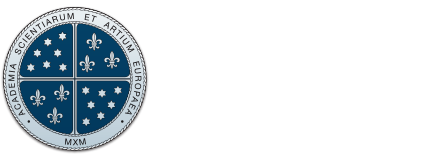
Symposium on King Samo illuminated his significance in the academic community

Alma Mater Europaea – ISH, in collaboration with the Slovenian Academy of Sciences and Arts, organized a scientific symposium on King Samo on the occasion of the 1400th anniversary of the beginning of his reign.
With the symposium dedicated to King Samo, we aimed to shed light on his role from political, legal, literary, and cultural perspectives, as well as his significance for the development of Slavic nations and Slovenian national identity," emphasized Dr. Ludvik Toplak, the president of Alma Mater Europaea and the president of the organizational and program committee of the symposium, in his address. He added that the event confirmed the traces of historical connections among Slavic nations from the times of King Samo to the present day, also within the academic community.
.jpg)
Professor Dr. Peter Štih, the President of the Slovenian Academy of Sciences and Arts, spoke about King Samo from a historical perspective. "It is impossible to overlook the national-ideological charge that the study of his history had among Slavic nations, as the victory over the Frankish king Dagobert I. at the unknown Wogastiburg in 631/32, during national conflicts between them and the Germans, played a distinctly affirmative and emancipatory role. Only one relevant historical source reports on Samo, namely Fredegar's Chronicle. This situation allows for very different interpretations, including fundamental aspects such as where the center of Sam's kingdom was, where Wogastiburg was located, what internal structure his kingdom had, and ultimately, whether the Slavs of the Eastern Alpine region were also included in it," Dr. Štih clarified.

In her presentation on King Samo's merchants, Dr. Naďa Profantová from the Archaeological Institute of the Czech Academy of Sciences highlighted the rise of Samo as a ruler of Western origin. 'According to some researchers, the Czech Republic formed the western part of Samo's empire, and at times, Wogastisburg was located in the area of the Poohří/Eger/Agara river,' Profantová explains, illustrating the settlement network of the Czech Republic in the 7th century with its center in Roztoky near Prague.

Professor Dr. Marko Snoj spoke about Old Slavic during the time of King Samo and presented Old Slavic terms for the title of king: 'King could not have been the title, as the predecessor of this word did not exist in Old Slavic at that time. Perhaps he was celebrated with the word *waldūkā, from which the common Slavic term *voldyka developed in the 9th century, leading to Old Czech vládyka and South Slavic vladika, preserved in our region in the surname Ladika. Alternatively, he may have been honored with the original Germanic word *kuningu, which through *kbnędzb gave rise to our prince – or simply with *wajewadija, from which duke originated.'

Professor Dr. Darja Mihelič from the ZRC SAZU presented the tradition about the ruler Samo in historiography up to the 18th century. She highlighted a fundamental source containing information about the merchant and later ruler Samo: 'It dates back to the year 660 and is attributed to the catechist Fredegar. This record was followed in 835 by the Gesta Dagoberti and around 870 by the Document on the conversion of the Bavarians and Carantians.

Samot's Central European rule in the mirror of Austrian historiography after 1945 is presented on behalf of Dr. Feliks J. Bistra from Vienna was described by Dr. Vincenc Rajšp: "In Austrian historiography, the finding of Fredegar's chronicle dominates, which calls Sam a 'Frankish merchant' who joined the Slavs in the fight against the Giants and distinguished himself by his valor that he was chosen as their commander or elected him king. This is followed by Zöllner, one of the most respected Austrian historians, who refers to Sam as 'the king of an independent Slavic state."

Dr. Jakub Izdný from the Faculty of Arts at Charles University in Prague outlined Samo's empire in recent Czech (and Slovak) literature and discussed the challenges associated with its exploration, which constitutes a renowned issue in the early medieval history of Central Europe.

The contribution of Dr. Aleš Maver from the Faculty of Arts at the University of Maribor addressed various aspects and highlights the portrayal of Samo's character and achievements in Slovenian historiography. 'The starting point is Anton Tomaž Linhart, but relatively significant attention is also given to the influence that France Prešeren had on the perception of milestones in the ancient history of the Slovenian ethnic space with his poetic opus.'

With the presentation on 'Narratio iuris in Samo's tribal union,' Dr. Borut Holcman from the Faculty of Law at the University of Maribor concluded the sessions: 'For "narratio iuris," a legal culture is necessary, which emerges from the foundations of the state, religion, and culture. It is not enough to have only the state; faith (hope) and a culture built on reciprocity is necessary. In the legal-historical evaluation of materials that enable the recognition of elements of statehood, legality, and the resulting religious and cultural ties, the author strives to identify in practical life the starting points for abstract matter - law.'






